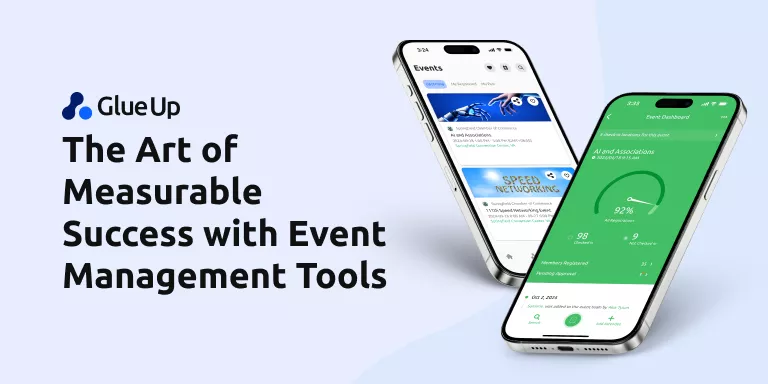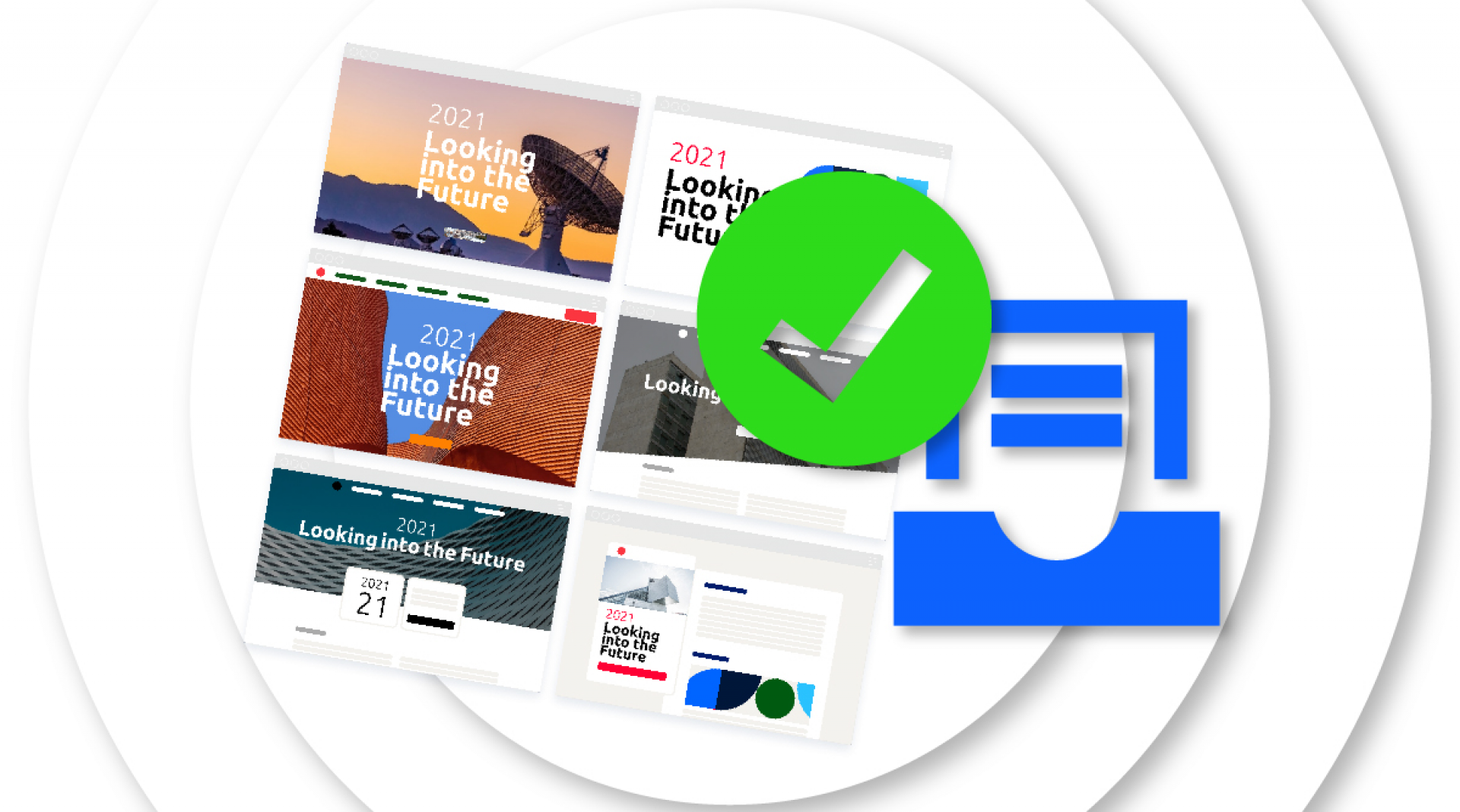
Are you planning an event for employees or clients to foster interpersonal relationships, promote business and sales, or increase revenue? As part of corporate event planning, you need to set clear goals and commit to a plan for successful strategy execution.
In this article, we will offer some valuable tips for in-house event planners to bring your vision to life and ensure your next event is the best yet.
Quick Reads
- What is Corporate Event Planning?
- What Are the Types of Corporate Events?
- Set the Event Goals and Objectives
- Create Your Event Budget
- Decide On Your Audience
- Plan the Event Theme and Format
- Have a Smart Venue Sourcing
- Arrange Event Logistics
- Develop a Great Event Marketing Plan
- Encourage Attendee Engagement
- Make Use of Technology
- Follow Up With Attendees
- Event Planning Checklist: 5 Tips to Make Sure Your Event Is COVID-19 Compliant
What is Corporate Event Planning?
Corporate event planning is essential in building the credibility of a business or an organization. It’s a tool that helps market a brand message both internally and externally.
Compared to typical events, corporate business events don’t often have ticket selling and sponsorship selling. When executed the right way, it can be a straightforward way to improve a business while leaving a lasting, positive impression on customers and clients.
As you achieve and sustain business growth through it, you can boost entrepreneurial confidence, increase brand awareness, and establish credibility in the industry.
What Are the Types of Corporate Events?
You can organize many different events in the corporate world, which will depend on your objectives. If you are not sure what type to host yet, here are some of the best examples of corporate events.
1. Conferences
A conference gathers a large group of people to discuss a particular subject or topic. They share a common interest and exchange ideas with one another to gain and develop different perspectives.
It is much larger and more formal than a meeting, which is usually a coming together of three or more people to discuss information.
Conferences are often held in a conference room, conference hall, or meeting room to offer a suitable environment with the right equipment that can run it successfully. This is also important to help participants stay focused on the topic at hand without distractions.
Launching a successful conference requires plenty of time, extensive planning, and ample resources. If you seek to connect and create a global professional network, you may opt to plan and organize a conference abroad.
Once you’ve set your event goals, priorities, and agenda, we advise that you familiarize yourself more with the different types of conferences.
2. Seminars
Businesses and corporations often sponsor a seminar to provide new knowledge, offer training, or discuss the best practices about a topic to employees.
A seminar typically consists of 10 to 50 individuals who are unfamiliar with each other but are all open to new learnings and ideas.
Seminars often tend to appear less formal compared to conferences. Participants often prepare and deliver a presentation to the audience briefly.
Also, while conferences usually last for a few days or weeks, seminars are much shorter. You can limit them to an hour or three in the afternoon rather than expecting attendees to participate the entire day. They frequently take place in a function room or an office conference room.
You can share some new ideas or theories during a seminar, especially if you want to share some thoughts and gain insights. It's a small group that's ideal for receiving honest feedback to help you improve.
Some common types of seminars in business focus on personal development or business strategies.
3. Trade Shows
A trade show is an event held that brings different business industries together to showcase, display, and demonstrate their latest products.
It is often exclusive to members of the press, company representatives, and top industry professionals.
Despite the challenges corporate event planning companies may face, 93% of face-to-face marketers see trade shows as an effective marketing medium.
There are many opportunities for prospects as attendees are granted access to the latest technologies, newest features, special pricing, and valuable industry insights.
In addition, companies can freely exhibit their new products and services. In fact, over 92% of trade show participants say their main reason for attending is to get updated with the latest featured products.
Other advantages of attending an exhibition are the opportunities to network with other professionals, increase brand awareness, generate leads, and interact with the media.
4. Product Launches
Product launch events are usually internal meetings that gather employees and the media to announce and discuss upcoming products and their release to the market.
Business-to-consumer (B2C) companies usually launch this type of corporate event. Planning is essential to conduct a product launch effectively. When done right, customers will be knowledgeable about new products and understand their features more.
In return, you can leave a good impression on them, which can help reach business revenue and profitability goals.
Product launches of different sizes and types allow you to sequence the events that lead up to or even past a product launch date. Your ultimate goal is that all company employees, business partners, and target audience are fully aware of your products and the value they bring.
5. Networking Events
Networking events are organized for participants to discuss ideas and share insights. Typically, these events gather people within a specific industry, including employees, clients, prospects, and more.
Attending a networking event can be beneficial, especially in building a meaningful relationship and rapport with people. In business, having a strong professional network can build confidence, raise your profile, and give you access to different business opportunities.
Speed networking falls under this type of event. It’s a structured networking method that allows participants to meet many people in a short amount of time. During this event, there are often one-on-one brief informational exchanges that happen that would enable individuals to learn more about each other.
If you’re interested in a full-suite networking platform for your organization, be sure to check Glue Up’s Speed Networking software.
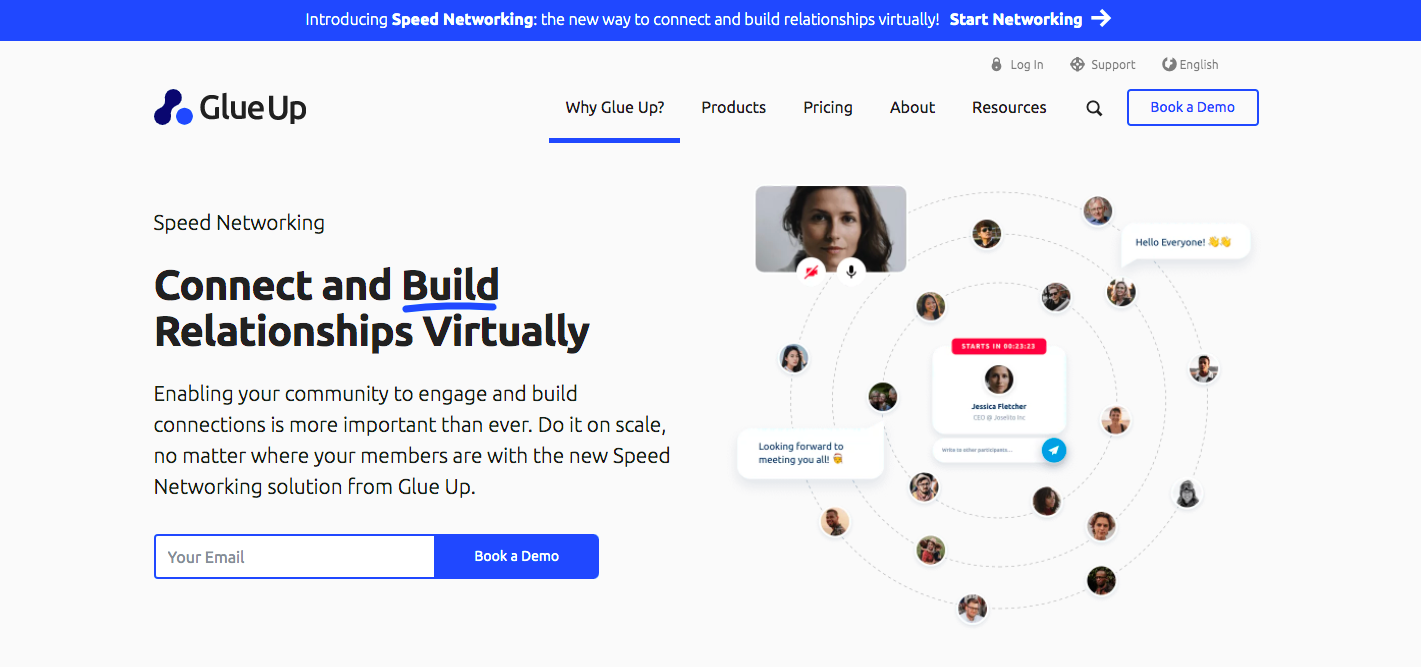
It’s perfect for anyone seeking to build relationships virtually, network with other event attendees, and engage in a one-on-one chat.
It comes with excellent networking features–an event room, a community hub, a direct messaging capability, and a meeting request functionality.
On top of that, there’s an option for you to have administrator privileges, which can allow you to define the length of sessions, manage roles and permissions, and moderate content, among others.
Set the Event Goals and Objectives
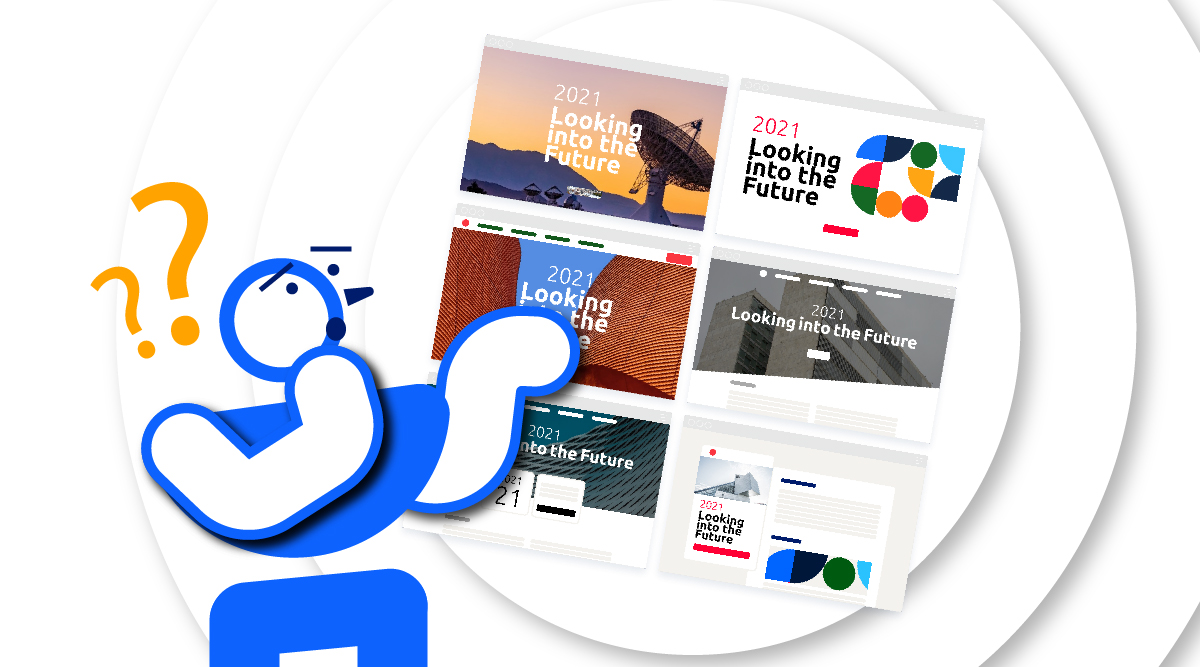
Well-defined project plan template can ensure the success of the event. When you’ve clearly outlined event goals and objectives, you can formulate a focus strategy that’s in the direction of your desired results.
For this reason, goal setting and developing a plan are the most critical steps of event planning. When you create a goal roadmap, you can expect an event to reach its full potential while maximizing the benefits and providing participants with more value.
A set of well-defined goals for an event can:
- Boost business growth
- Enhance marketing strategies, increase sales, and achieve human resources objectives
- Improve team efficiency and productivity
- Help members understand why they attend certain business events
- Allow you to easily track KPIs related to event marketing activities
To get you started, the first step you need to take is to choose an event type and formulate the objective.
Determine what a corporate event will be about and what it will focus on. Whether it is a team meeting or a corporate conference, clear and unambiguous goals ensure a smooth-running event that aligns with the desired outcome.
The main focus should be event attendees, so it’s best to consider and meet their needs and expectations.
Make a list of the things your guests would expect to obtain and plan on how you can offer an event attendee experience like no other. When done right, they will return for more and be eager to share their enthusiasm with others.
Create Your Event Budget
Whether you're new to event planning or you're an established professional event planner, setting a budget for an event can help you prepare for all expenses while preventing going over budget.
Once you’ve identified the type of event you plan to organize, you can start to estimate the overall budget you should allocate for it. It’s best to consider your available resources first during the planning phase.
Going back to your past events can also help you gather the information you need to create a budget for an upcoming event. Evaluate them and check if there are areas you over or underspent on.
After this, you can formulate a high-level event plan that consists of event goals and basic logistics.
In addition, you can begin to include rough budget estimates. List down the must-have items like the venue, catering, food and beverage, transportation, speakers, and many more to better understand the total expenses.
Decide On Your Audience
Get to know more about your target audience to reach and encourage them to participate. If you're able to gather detailed information about your prospects, promoting the event will be easier.
Some of the common characteristics in event marketing are age, gender, occupation, geographic location, and technological knowledge.
To identify an event's target audience, you first need to define your attendees' persona profile.
It's also essential to get to know attendee characteristics and interests depending on the type of event.
For example, if you seek to promote digital marketing tools, persona characteristics like IT and software companies will fall under the categories interested in the products and services you offer.
Furthermore, you can research more about these companies and the specific roles within and assess who among them would find what you offer valuable and useful.
If you've organized a similar event in the past, look at your past attendee summary report. Doing this can help you learn more about your target demographic, which includes their preferences, motivations, and actions.
Plan the Event Theme and Format
Event planners should set a well-thought-out theme that’s in line with the event objectives. It should reflect a goal or objective it aims for and supports the purpose.
Themes enable speakers and facilitators to gain more profound knowledge of the audience and their expectations.
In addition, they serve as a guide for someone to speak the same language as the audience and have a deeper understanding of their needs in the industry.
When chosen well, a theme can generate a buzz or build suspense for a social event. Crafting effective communication and planning exciting activities that support guests' needs can encourage them to share the event within their social circle.
In return, it can promote awareness and boost credibility, which can improve your marketing efforts. Make an event stand out by using unique event decor and backdrops to encourage guests to interact with each other and engage with your event theme.
Custom photo booths built specifically for your event can motivate them to share on social media during or even after the event, which can help reach its full growth potential in the future.
The right colors for your event matter and should coordinate the event objective, feel, and message.
Have a Smart Venue Sourcing
It is important to pick a venue that is most convenient and appealing to your attendees. However, your choice of venue would be different during and even post-Covid-19 as you will need to adapt to their priorities and some legal requirements.
Consider the number of expected attendees, available space, and seating capacity. You may only have a few attendees for an in-person event. On the contrary, it will require more space per person than before to give way for effective social distancing.
List down all the potential event venues and inquire how they adhere to safety guidelines. Discuss how they will set up the spaces to lower the risk of infection.
Event food is something that you should also prioritize. Ask the event venue how they will prepare and present meals, and what hygiene measures will be followed.
Be open to seeking assistance from them in strictly maintaining social distancing and safety at mealtimes during the event.
Arrange Event Logistics (Including but Not Limited to Catering and Food)
Event logistics is the planning, controlling, and managing of the transfer, storage, and operations usually performed by an event organizer to ensure smooth event planning and management.
Its main objective is to effectively plan an event, supervise all the people involved, and have all the materials needed for a successful launch. Also, an efficient event logistics service for an event lets you deal with external vendors with ease and offers cost-effective event planning, preparation, and execution.
Event service logistics include venue selection, transportation, accommodation, warehousing & distribution, and event registration desk.
Develop a Great Event Marketing Plan
If you want to build brand awareness, increase customer engagement, and generate leads, you need to develop a compelling event marketing strategy.
Marketers and event planners create effective strategies for marketing events to promote their brand, products, or services, whether in-person or online. In addition, event marketing can help boost customer satisfaction, increase retention, and improve engagement.
Executing events pave the way for your partners and sponsors to promote engagement that can increase their return on investment. Companies may opt to participate and attend as hosts, participants, or sponsors.
Encourage Attendee Engagement
Keeping attendees engaged during events plays a significant role in the overall success. With the COVID-19 pandemic disrupting the normal flow of events, event organizers have been forced to adapt to a new way of executing events and switching to virtual and hybrid formats.
With short attention spans, the online audience may fail to concentrate more as there are more opportunities to "zone out" in front of their computers.
However, utilizing the best event technology tools and being more creative can help you create an event that can attract and hold people's attention in a virtual setting.
If you're keen to know how to increase event engagement, you need to launch an appealing and productive event online, assign a great event host, prepare exciting content, organize polling during events, host interactive quizzes, and leverage event gamification.
Make Use of Technology
To function efficiently as a team when preparing an event, you need to develop effective team communication.
Compared to the limited capabilities of using an email, a project management system can improve planning, promote better collaboration, and improve an organization’s productivity.
Basecamp is a popular cloud-based project management system that keeps track of all the tasks, stores files, and supports online discussions revolving around work.
Today, event management platforms and apps help you keep track of projects, provide seamless onsite check-in of attendees, and automate the entire event process from registration to promotion.
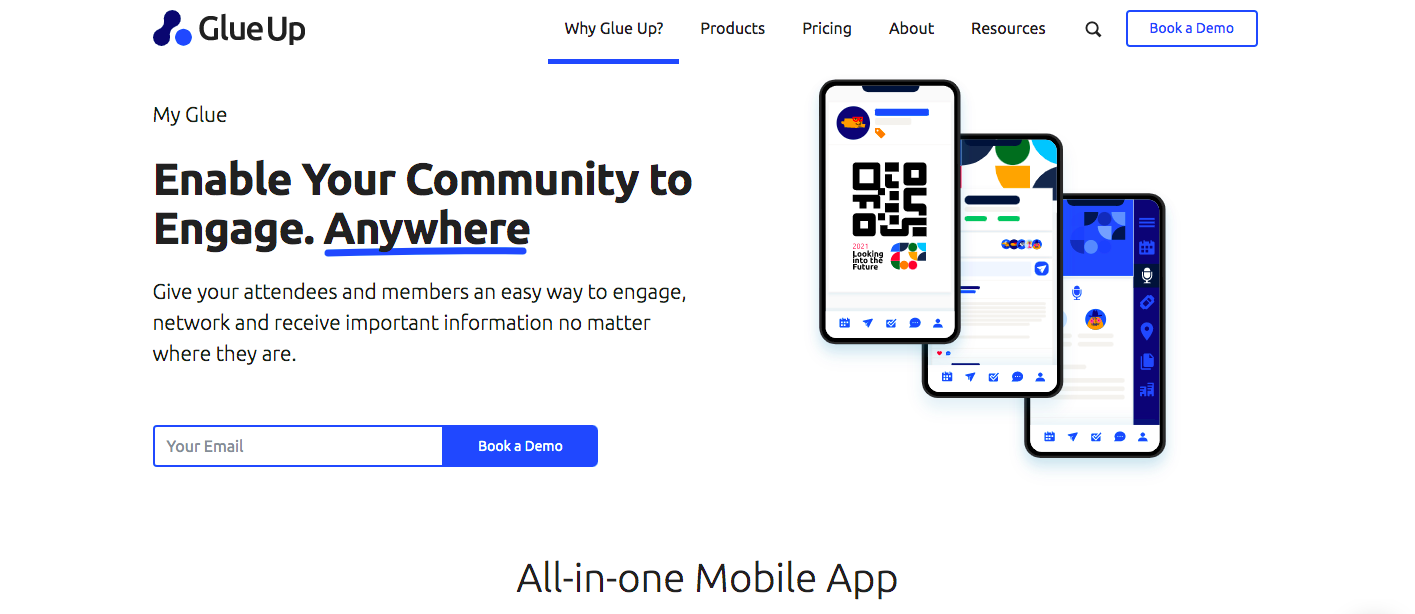
My Glue is our all-in-one app that allows attendees and members to engage, network, and receive important information with ease no matter where they are. With it, everyone can interact with one another and build meaningful relationships using event rooms and engaging in 1-on-1 chats.
What’s more, attendees can network better as it allows them to exchange digital business cards and efficiently manage their contacts on the mobile app.
If you want to create a memorable event experience for your hybrid and virtual events, you can also check out Hoppier. It lets you easily send virtual event attendees lunch, cocktails, gifts, and more.
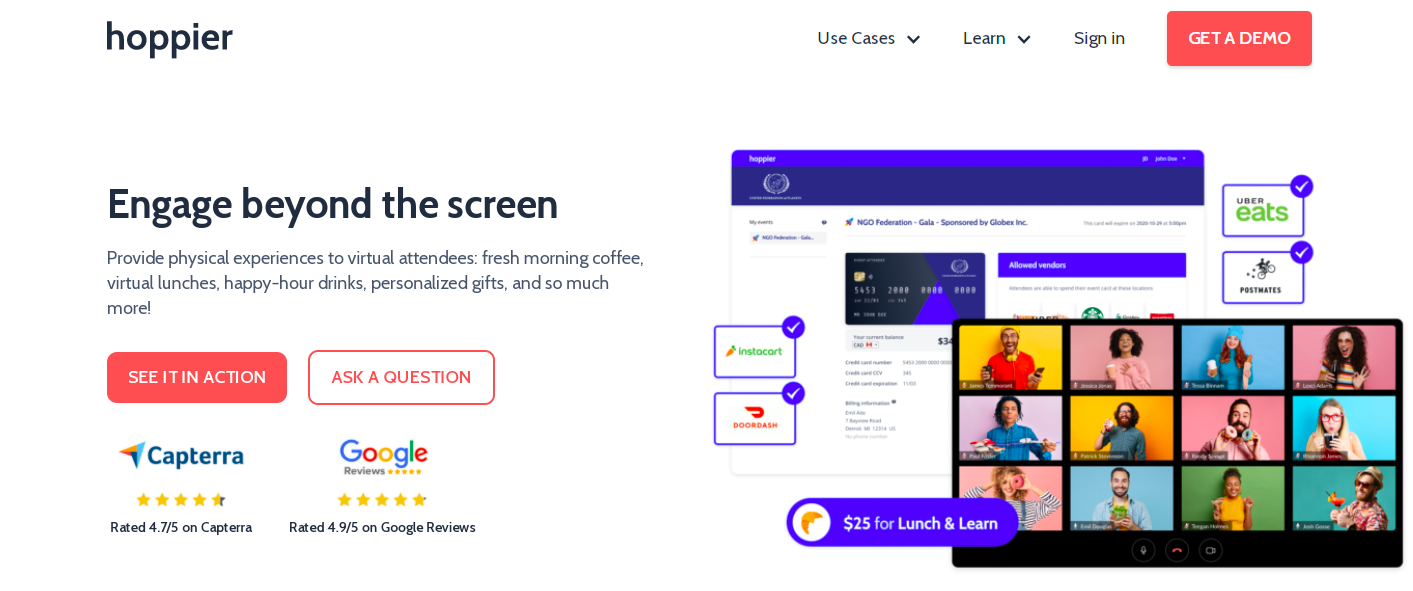
Also, event attendees can use digital cards to order food to the venue during a product launch or coffee to sip as they attend a networking event.
Follow Up With Attendees

Once the event is over, make time to reach out once again and show appreciation to those involved and who participated. Follow up with everyone, say thank you, and gather feedback to show that you care as you continuously build meaningful relationships.
We advise you to do it within 24 hours. It’s always best that you follow up quickly so that the attendees can still remember you and are still full of enthusiasm after the event.
To help people remember who you are, bring up a topic or a conversation you discussed in the email and provide links to social media with appropriate event hashtags.
You should follow up via email marketing and newsletters if you opt to send an email or an email campaign. Always be willing to offer help and provide more information about the event to make others feel valued and appreciated.
Event Planning Checklist: 5 Tips to Make Sure Your Event Is COVID-19 Compliant
As the COVID-19 pandemic continues, you need to maintain a clean environment to reduce risks when hosting events. For this to happen, here are some corporate event planning checklist and tips for in-house event planners to make sure that you host a safe in-person event.
1. Clean, Disinfect, and Sanitize the Event Place
Learn about the type of surface and check if it’s frequently touched. Generally, there’s a higher risk if more people touch it often.
Cleaning high-touch surfaces at least once a day is highly recommended. On the other hand, you should do it twice a day and perform disinfection after if it’s a high traffic area.
Learn about the right cleaning products to use, and check if you should require personal protective equipment (PPE) for cleaners.
2. Organize an Outdoor Event
The COVID-19 virus is transmissible from person to person in close contact, within about 6 feet through respiratory droplets released into the air.
Since enclosed spaces typically have poor ventilation, the COVID-19 virus can infect a person when exposed to small droplets or aerosols that last in the air for hours.
Therefore, organizing an outdoor event is highly encouraged, as it allows fresh air to move constantly while dispersing these droplets. This lessens the risk of breathing in respiratory droplets containing the virus, especially if you haven’t had a COVID-19 vaccine yet.
3. Post Signs and Messages
Look for obvious locations like entrances and restrooms where you can post some informative signs. The intent of every post should be to promote simple protective measures and inform the public on how to stop the spread. It could be about properly wearing a mask, ways to maintain physical distancing, or the importance of washing hands regularly.
4. Require Everyone to Wear Masks
Inform all staff and attendees that they are required to wear well-fitting masks that can cover their noses and mouth. Make a plan beforehand on how this will be strictly implemented and monitored. Be willing to offer masks on-hand to those who fail to bring their own.
5. Promote Social Distancing At All Times

The size of an event should be based on the number of attendees, which can allow them to stay 6 feet apart.
Make sure to remind attendees upon arrival to maintain physical distance, especially from those they don’t share the same household with.
Tell attendees and staff that greeting each other with physical contact like a handshake is highly discouraged.
Thoughtful Planning Goes a Long Way for Your Next Corporate Event
With thoughtful planning, launching a successful corporate event can be simple and easy. While there are times that you may feel overwhelmed, if you carefully plan and consider the right steps to take, you can manage an event with ease and adhere to the objectives you’ve set.
If you want to automate your next corporate event to increase event attendance and productivity, book a demo of our Event Management Software.
Our virtual event software has registration forms, an event website builder, an online ticketing payment system, and digital business cards that are customizable and easy to use, especially for managing and promoting events.

